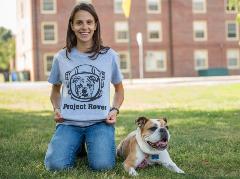Katie Potter, PhD |
July
24, 2019
I first became interested in studying the physical activity and health benefits of dog ownership when I was a postdoc. My dissertation research focused on the brain and cognitive benefits of exercise, so it was quite a shift (that’s right, grad students— I used to scan people’s brains, and now I do dog walking research!). I was working on a paper on social relationships and mortality risk, and I was contemplating how to create real, meaningful social connections for people that are lonely or isolated. While pondering this question I stumbled across a paper on dogs as social facilitators and I never looked back! Thankfully, I’ve had supportive mentors (Drs. Sara Wilcox and Rena Wing, two of the best!!!).

But, let’s be honest, I obviously had personal inspiration to study this topic—no cat person is typing ‘social facilitation + dog’ into PubMed (although I swear I like cats, too!). Back when I was a grad student in South Carolina, I was lonely and I found a little dog on Craigslist that needed a foster home. Classic white mutt with black patches and floppy ears. Chloe motivated me to walk every morning and every evening, got me talk to neighbors, kept me company and made me laugh. Every. Single. Day. Of course, I ‘foster-failed’ and she has been my best bud ever since (she will be 15 this year!). Thanks in large part to my experience adopting Chloe, the
Behavioral Medicine Lab at UMass Amherst is dedicated to rigorously investigating the physical activity and health benefits of the human-dog bond.
I think this area of research is timely for two reasons (please note that dog culture varies tremendously around the world and that my focus is in the United States). First, a ton of people in the U.S. own dogs, which means potential for high-reach interventions. Second, we are in the midst of a massive social movement to increase shelter pet adoptions (have you seen Ariana Grande on the cover of Vogue with her rescue dog, Toulouse!?). By involving more animal lovers in shelter dog walking or fostering programs, we might be able to increase physical activity and reduce sedentary behavior. And it would help get dogs adopted. Big win-win!
Since starting at UMass, I’ve led two pilot intervention studies in this area: one with dog owners and one with non-dog owners. For the BuddyStudy, we partnered with a large foster-based dog rescue organization to pair non-dog owners with foster dogs for 6 weeks. We examined how taking a dog into one’s home affects physical activity and psychosocial well-being (paper in progress!). The Stealth Pet Obedience Training (SPOT) trial tested basic obedience training as a stealth physical activity intervention for inactive dog owners (paper under review!). This summer we are piloting a dog walking obedience course with older adult dog owners (Project Rover). We are examining changes in walking and sedentary behavior with activPALs and looking at changes in physical function, cognitive function and psychosocial well-being. You see the word ‘pilot’ a lot in this paragraph—keep your fingers crossed that this groundwork translates to grant funding for full-scale projects!
Please follow our lab on Twitter (@DrKatiePotter) and Instagram (@umassbmedlab) to see all the latest happenings, including how things go with Project Rover! If you are a prospective graduate student, please reach out, as we are always looking for motivated team players to join our group. If you are a researcher who might want to collaborate on a human-dog bond project, we’d love to hear from you, too!
Thanks for reading!
 Katie Potter, PhD, is an assistant professor in the Department of Kinesiology at UMass Amherst. She earned her PhD in exercise science from the University of South Carolina in 2014 and completed a postdoctoral fellowship in cardiovascular behavioral medicine at The Miriam Hospital/Brown Medical School in 2016. Dr. Potter received the 2017 Paffenbarger-Blair grant from the ACSM Foundation to fund her research. Her Behavioral Medicine Lab focuses on designing and testing interventions that leverage the human-dog bond to promote physical activity and psychosocial well-being.
Katie Potter, PhD, is an assistant professor in the Department of Kinesiology at UMass Amherst. She earned her PhD in exercise science from the University of South Carolina in 2014 and completed a postdoctoral fellowship in cardiovascular behavioral medicine at The Miriam Hospital/Brown Medical School in 2016. Dr. Potter received the 2017 Paffenbarger-Blair grant from the ACSM Foundation to fund her research. Her Behavioral Medicine Lab focuses on designing and testing interventions that leverage the human-dog bond to promote physical activity and psychosocial well-being.